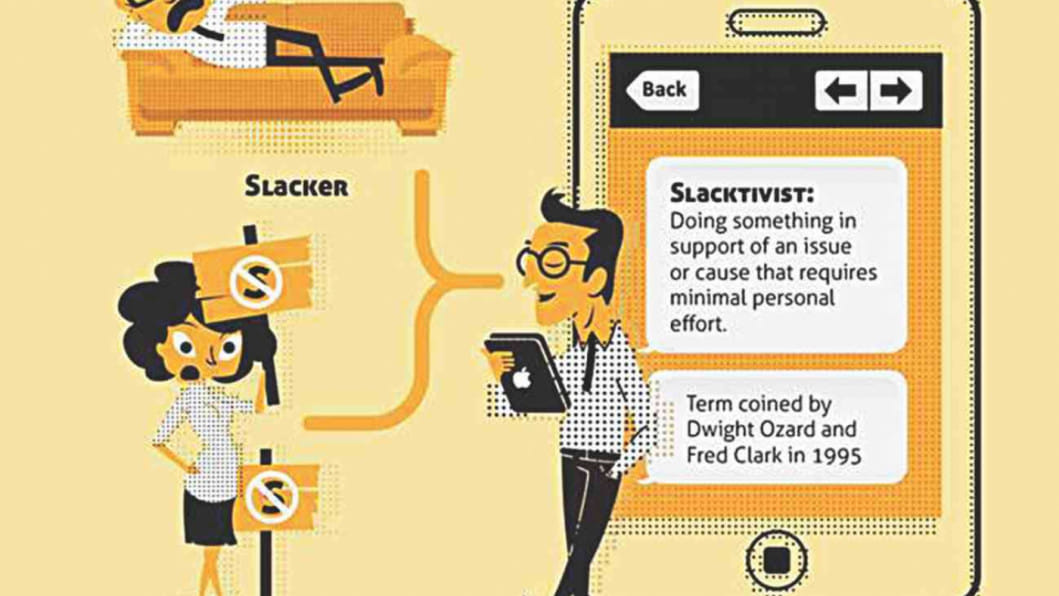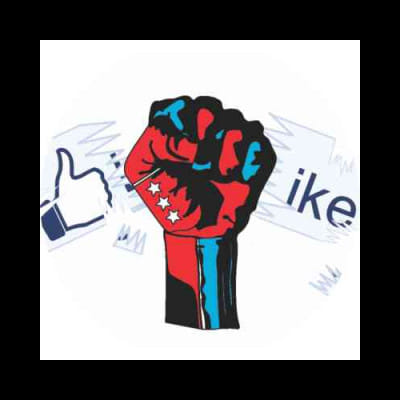Armchair activism

Was 2014 the year technology and social media took over activism? Many would argue it expanded on the decades of campaigning and activism that have been waged on the streets against the abuse of power, against racial and class segregation and inequality, for women's suffrage and the dignity of human beings. 2014 was a year full of issues that needed to be challenged. Boko Haram kidnapped hundreds of schoolgirls, Gaza was under fire again, Lima brought climate change to the forefront, while after a century of abolition of slavery, people in The United States took to the streets over the Ferguson incident. Bangladesh too had its own problems, the two most prominent of which – Rampal Power Plant and the Sundarbans Oil Spillage – shook those who care to the core. The year also saw the rise of awareness campaigns, from Movember to the ALS Ice Bucket Challenge.
In a way, 2014 could be called the year of online activism. Instead of protestors seizing government buildings or campaigns on health issues raising awareness at the grassroots, hashtags seized the public social media timelines. Celebrities joined the bandwagon, with even the US first lady tweeting, with her picture (of course for PR purposes), “#BringBackOurGirls”. Bill Gates donated to the ALS research fund after taking the Ice Bucket Challenge and there was a sudden spurt of men's facial hair all over the world, including Bangladesh, in November. But online activism has also come under fire and is derisively (and justifiably so) called slacktivism or clicktivism. The spirit of participation, and the understanding that drives people to the streets for a common cause, is now measured in terms of click-rates, re-tweets and how fast a hashtag went viral.
Activism has historically gone against abuses of power, inequality and greedy commercial ventures. When leftists complain activism itself has been reduced to marketing, it is no exaggeration. The message is carefully sample tested and taken through stages to appeal to the readers – a process no different from making an advertisement for hair products!
In Bangladesh, we jumped in and our Facebook statuses and Tweets talked of Gaza and Boko Haram. Reminiscent of the viral online activism against Kony (who still remains free) – but who remembers that now? Here's a recap, Joseph Kony, the Ugandan who had an army of child soldiers still remains free despite the viral activism that started against him in 2012. When responsibility ends after two clicks, one might feel good about being part of a wider picture, but it is foolish to think that equates to actually making a difference. So when it came to issues at home, where the mass of mindless sharers and re-tweeters could actually be part of ground level activism, the response was almost zero. Except for the committee for the protection of our natural resources, a few scattered leftist parties, and a handful of environmentalists, our activism ended before it began. Even the few who shared symbolic pictures of oil-drenched tigers, were met with regressive comments. We are part of online activism when it comes to a country other than ours; our general indifference and apathy come to light when the issues are our own.

Noam Chomsky, in an interview about the nature of activism, pointed out that when it comes to issues, rhetoric should not sway us. The hope that a leader will come from above and help us out of our miseries is delusional. Martin Luther King only became the leader and spokesperson of the civil rights movement when the oppressed were themselves protesting. Online activism instead thinks awareness and sharing of the issues to bring media attention to them is enough, since another more worthy will actually make the changes. Instead we saw stories about Michelle Obama tweeting about Boko Haram, not the Nigerians on the street in the country who were protesting not just the kidnapping but the wider issues of inequality, corruption and security.
That is not to say that all online campaigns ended in failure. The ALS Ice Bucket campaign resulted in 100 million USD in donation for the cause. After Movember, the donations for men's cancer research reached 80 million USD from a meagre 4000. However, for the majority who take part in these campaigns, it has still been an issue of social currency – taking part becomes a way to show one's altruistic side on social media with the added benefit of the feel-good effect. As one university student who was seen sporting a beard points out, “I did it because it was an excuse not to shave for a month. But I don't see anything wrong with jumping on the bandwagon either. Most of my friends did.”
When activism becomes about click-rates and constant analysing of its reach, re-tweets and shares, it loses its very essence. As a study on the effectiveness of online campaign shows, majority of those who take part never translate it into something tangible later. Only those, who had a prior interest in the issue before the campaigns, were likely to follow up their online activities with real world equivalents. For the most, campaigns end as soon as they begin, a diluted form of promotion bereft of the ideas and ideologies that go with any movement.
It is a shame to see the beauty of the Sundarbans being slowly engulfed in a patina of greed in the form of oil. As our greedy world sees in the intricate canals of the forest only underexploited resources for the generation to profit from, if the people do not rise up, the oil spillage will be swept under the rug as soon as a more sensational story breaks. For all the talk of Rampal on Facebook, and a profound lack of mass movement, the power plant is on its way to be realised. That in itself speaks more about the futility of social media as the sole and end form of activism.
...................................................................
The writer is a Feature Writer, Star Lifestyle, The Daily Star.

 For all latest news, follow The Daily Star's Google News channel.
For all latest news, follow The Daily Star's Google News channel. 



Comments